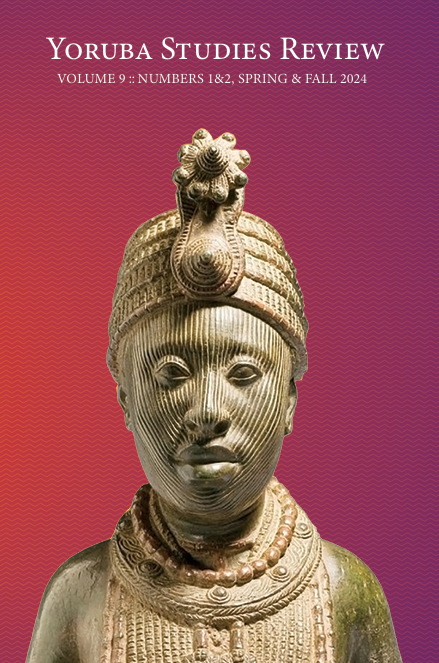Current Issue
The Yorùbá Studies Review is a refereed biannual journal. The journal embraces all disciplines in the humanities, social sciences, and the basic/applied sciences in as much as the focus is on the Yorùbá affairs and the intersections with other communities and practices worldwide. The journal will foster and encourage interdisciplinary and cross-disciplinary approaches dealing with a wide range of theoretical and applied topics including, but not limited to: cultural production, identities, religion, arts and aesthetics, history, language, knowledge system, philosophy, gender, media, popular culture, education and pedagogy, politics, business, economic issues, social policy, migration, geography and landscape, environment, health, technology, and sustainability. The journal seeks to serve as the platform for a new generation of transformative scholarship that is based on cutting-edge research, novel methodologies, and interpretations that tap into the deep wells of Yorùbá epistemology and ontology. The journal will also publish critical review essays, book reviews, and scholarly debates on topical issues. The Yorùbá Studies Review will publish research and review manuscripts in the five languages that are primarily used in the Yorùbá world—English, French, Portuguese, Spanish, and Yorùbá. Where possible, abstracts of papers will be translated into English.
Articles
The Yoruba Studies Review is a refereed biannual journal. The journal embraces all disciplines in the humanities, social sciences, and the basic/applied sciences in as much as the focus is on the Yorùbá affairs and the intersections with other communities and practices worldwide. The journal will foster and encourage interdisciplinary and cross-disciplinary approaches dealing with a wide range of theoretical and applied topics including, but not limited to: cultural production, identities, religion, arts and aesthetics, history, language, knowledge system, philosophy, gender, media, popular culture, education and pedagogy, politics, business, economic issues, social policy, migration, geography and landscape, environment, health, technology, and sustainability. The journal seeks to serve as the platform for a new generation of transformative scholarship that is based on cutting-edge research, novel methodologies, and interpretations that tap into the deep wells of Yorùbá epistemology and ontology. The journal will also publish critical review essays, book reviews, and scholarly debates on topical issues. The Yoruba Studies Review will publish research and review manuscripts in the five languages that are primarily used in the Yorùbá world—English, French, Portuguese, Spanish, and Yorùbá. Where possible, abstracts of papers will be translated into English.

